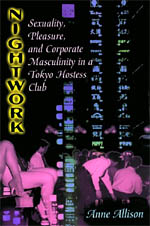The Return of Hostessing

Last week, the New York Times reported on a once-maligned profession making a come back in recession-era Japan: hostessing. It turns out, in the post-boom economy, these high paying jobs are highly coveted and the women who fill them increasingly respected. A few years back, the Press published a book on hostessing called Nightwork: Sexuality, Pleasure, and Corporate Masculinity in a Tokyo Hostess Club. We called on its author, Anne Allison, to respond to the report. Here’s what she had to say:
As the New York Times reported, a profession that once was “scorned” for Japanese women has become much more normalized, even fashionable, in the recent downturn of the economy. This is hostessing: attending to customers by lighting cigarettes, pouring drinks, and massaging egos in a service that is sexual if not sex per se. As a practice, hostess bars and clubs grew up in the high economic growth period of postwar Japan when they were a popular site for business entertainment—trust was built during lavish nights that could cost astronomical sums, all charged on business expense.
It was at the height of the bubble economy that I did my own research on hostess clubs. Interested in how Japanese corporate capitalism was being fed by the fantasy interactions between hostesses and customers, I became a hostess myself, working for four months in a high class hostess club in the Roppongi district of Tokyo. As a graduate student of anthropology at the University of Chicago, this “fieldwork” was the basis of my dissertation, and later book. As I discovered then, a double-standard adhered to the gendering of roles in the hostess world; respectable salarymen treated hostess “play” as a (sanctioned) extension of work, but hostesses who actually worked here (instead of marrying and becoming wives) were stigmatized as socially “dirty.”
But things have changed in the post postwar environment of these now recessionary times. Since the bursting of the Bubble in 1991, the economy has been dire, destabilizing jobs particularly for young people (one-half of whom work in so-called irregular jobs characterized by low wages and no security). Women have been harder hit yet (70% are irregularly employed) and, with the job market so depressed, working in what is the current arena of hostessing—kyabakura (cabaret hostess clubs)—has become both a viable and attractive option. Not only are wages higher there, but jobs are more available. But what does it mean that such a profession has become more acceptable for women today in Japan? Is this a sign of a feminist revolution, a greater parity of gender roles and a loosening of the old gendered division of labor (women marry while men work outside)? Hardly, I would say, particularly given that such career options are being driven by the very paucity of viable employment elsewhere in a job market that continues to discriminate against women (and Japan is the worst of all industrialized countries in this regard). Further, while becoming a kyabakura jo (hostess) is seen as desirable by more and more young women, becoming an old-fashioned housewife—staying at home supported by a husband’s salary—is even higher-rated for the longer-term economic security such a marriage once assured (but, in reality, is far less likely to today). One of the newest social trends this year, in fact, is konkatsu—hunting for a marriage partner as one does for a job. What women say they are looking for—with marriage and even hostessing too, to a degree—is safety: being comfortable and secure in a material, everyday sense. So, on the one hand, women are still seeking marriages in which men are expected to bring in (more of) the salary. On the other hand, they are taking things into their own hands and working where they can get the best pay—in a realm where the bruised egos of men still need bolstering.
So, a Japan where gender politics is both more of the same, but also beginning to show signs of a change.